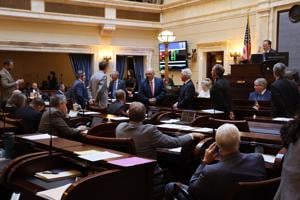Cox signs fiscal year 2023 base budget

(The Center Square) – Utah’s $22.2 billion base budget for fiscal year 2023 includes an additional $57 million in rainy day fund deposits, according to a news release from Gov. Spencer Cox.
The base budget is the first step in the state’s two-step budget process and is based on the previous year’s spending, according to Derek Monson, vice president of policy for the Sutherland Institute, a think tank located in Salt Lake City.
“The base budget was established a number of years ago after there was something of a political battle between the governor and the Legislature, where the governor threatened to veto the whole budget if she didn’t get a particular thing funded,” Monson said. “And after that, out of concern that the Legislature could potentially end without a budget if that kind of thing was followed through, they created this base-budget process, which allows them to effectively come up with, you might call it, a fall back budget, or a beginning budget level, based on previous year’s spending.”
Lawmakers hold budget hearings at the beginning of each legislative session and must pass the base budget within the first 10 days.
Cox signed the eight base-budget bills Wednesday. He praised lawmakers for continuing to build on rainy day funds.
“Utah has consistently built rainy day reserves since the last economic downturn – even during the current COVID-19 pandemic,” Cox said in a news release. “The state’s major rainy day fund balances total more than $1.15 billion as of [fiscal year] 2022, including $231 million in deposits made at the end of [fiscal year] 2021. We’re thrilled the Legislature agrees that planning for future unknowns is vital to our economic health with the allocation of an additional $57 million in rainy day fund deposits.”
The base budget includes $8.95 billion from the discretionary general and education funds, but it does not include any federal COVID-19 relief funds, according to Alexa Roberts, communications manager for the Utah House.
The budget likely will change since lawmakers have not received revenue numbers from the end of 2021.
While the base budget typically represents about 97% of the state’s final budget, it never has been the same as the final budget passed at the end of the legislative session.
Lawmakers are considering two changes that could affect the outcome. Some lawmakers are wanting to go beyond Cox’s $160 million grocery tax rebate and eliminate the sales tax on food altogether.
The House has yet to pass a bill that would cut the state’s income tax rate from 4.95% to 4.85%. Any changes to the tax cut would affect the budget.
Disclaimer: This content is distributed by The Center Square
